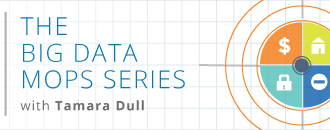
What do the following companies have in common: Google, Facebook, Twitter, LinkedIn, Orbitz, Airbnb, Angie’s List, Match.com, OpenTable, and Uber?
Here’s what I came up with:

What do the following companies have in common: Google, Facebook, Twitter, LinkedIn, Orbitz, Airbnb, Angie’s List, Match.com, OpenTable, and Uber?
Here’s what I came up with:
- Presence. They’re all online; they have no brick-&-mortar presence. If their website or mobile app is unavailable, it’s as if they don’t exist.
- Primary asset. Their primary corporate asset is data, specifically data (mostly big) created by users. They do not sell physical inventory.
- Business model. Their primary function is to connect users with the right web page, person, and/or service. If connections aren’t relevant, quick, or easy, users move on.
- Revenue model. They make their money by connecting the data dots, primarily through advertising or service fees. If connections aren’t made, money is lost.
- Top companies. Interestingly enough, Google, Facebook, Twitter, LinkedIn, and Orbitz are included in Forbes’ 2014 ten best companies to work for list. And Google, Facebook, and Twitter are included in Glassdoor’s Top 25 Companies for Culture & Values 2014 list.
Bottom line: If any of these companies fail to keep collecting and connecting the data dots for its users, for whatever reason, they will go out of business.
About data as a corporate asset. Let’s take a closer look at the point that these companies’ primary asset is data. For over a decade, industry analysts, management consultants, and vendors alike have been talking about managing data as a corporate asset. What does that mean? Jill Dyché, co-founder of Baseline Consulting and current vice president of SAS Best Practices, explains it this way:
“To understand what it means to manage data as an asset, you first have to understand the business definition of the term ‘asset.’ First, the asset needs to have a value; second, that value needs to be measurable; and third, it helps a company achieve its strategic objectives. When managed the right way—that is, as an asset—a company’s data meets these three criteria.”
Why this matters. Managing data as a corporate asset is no small feat. It’s just plain hard work that requires the rigor of and investment in data asset management tools—not to mention the cooperation of and coordination between the business and IT. Why sign up for this headache when you and your colleagues have more than enough to do and bigger fish to fry?
Here’s why: Data is driving your business. If it’s not, it will be and/or it should be. We are living in an already-connected economy that’s becoming even more connected because of the exponential growth of data and devices. This is what the Internet of Things discussion is all about. The good news is that this data can provide insight into your business performance and strategic direction. The bad news is that you could drown in it. Manage your data before it manages you.
Questions to think about. Jill Dyché often tells executives: “A company’s ability to use information strategically is directly correlated to the degree to which the data is managed.” To help executives get a sense of how they’re doing with managing data as a corporate asset, she asks them these five questions:
- Are you giving your corporate data – big and small – resources comparable to your other corporate assets?
- Are you dedicating technology comparable to your other corporate assets?
- Are you allocating funding relative to your other corporate assets?
- Do you measure the cost of poor, missing or inaccurate data?
- Do you understand the “opportunity cost” of not delivering timely and relevant data to the business?
These questions have made more than a few executives squirm. But if you were to ask the executives of the 10 companies mentioned earlier, they’d answer a resounding “Yes!” to each question. Why? Because their data is intimately tied to their company’s core strategic objectives. (And yes, I’m cautiously optimistic that they’re also managing this data well.)
One final thought. I kicked off this blog series with this strong admonishment: “If you’re not using big data to improve your business – e.g., revenues, profits, operational efficiencies, decision making, etc. – then don’t do big data. It’s not worth the time, money or hassle.” Or in other words, big data is about making money.
So even if big data is not your core business, like it is for the companies in this post, managing your data – big and small – as a corporate asset is absolutely vital as your company makes its way in today’s connected marketplace. To not manage your corporate data is to rob your company of its strategic edge.









